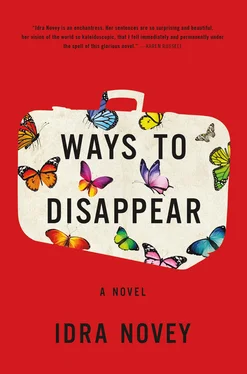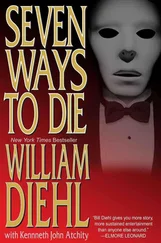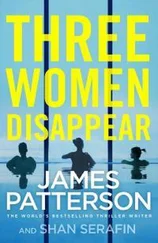You need to tell your brother and that translator to stop screwing around and get the money, you hear me? he said from behind her, breathing into her ear.
She tried to say yes but his arm was still tight around her throat.
I said did you hear me? the man repeated, and then the muzzle of the gun was no longer against her back and she heard a knife snap open, and his other arm appeared, bringing the blade to her neck. Get the money, he said, or one of you is done, amiga. They will gun you down. This visit is a favor, eh? You hear what I’m saying?
A few feet away, she heard people strolling by, one of them laughing. If she screamed, they’d surely hear her, but maybe it would increase the chance that he’d panic and slit her throat. Or they wouldn’t come for her. Not on a run-down side street in Copacabana, not at ten in the evening.
Then as suddenly as the man had gripped her throat he let go. He was gone. For a moment, Raquel didn’t move. She just stood there bracing for something more, something worse. Someone had urinated recently on the slats of cardboard under her feet and the doorway smelled horrible. She hadn’t registered the smell until the man let go but didn’t know if she should leave yet. What if the man was still lurking nearby, waiting to see where she’d go or who she might call? She pictured her mother dragged into a recessed doorway like this one, full of garbage reeking of urine, imagined how long her mother would have remained there, trembling.
At the thought, Raquel forced herself out onto the sidewalk. A man blurred by on a bicycle and she cried out in alarm. From the jutting hill of a near favela came the stutter of shots of an assault rifle. For a second, the single seam of streetlights running through the favela gleamed brighter. Then the seam folded into the dark.

The whole way to her mother’s, Raquel sensed someone waiting for her. He was behind the bus, or pretending to read the headlines at the news kiosk. He was the young man lurching toward her in a blue muscle shirt, or the older one in a cheap suit swearing into his phone.
Another block went by and no one jumped her.
Then another.
In five minutes, she would be able to double-lock the doors and eat bowls of cereal in her mother’s kitchen. If no one grabbed her before then, if she didn’t have a panic attack, she could spend the night in her old room. She’d already passed Belíssima Fashion and the Unibanco. With each building, fewer men looked as though they were waiting to cut her throat. She took in the red stilettos on sale at Lulu’s and the window after that, at the bookstore Livraria Cultura — where suddenly there was her mother’s face, blown up on a poster wide as a windshield, her unsettling green eyes magnified to the size of headlights.
Next to her mother’s face was an equally gigantic image of the cover of her last novel: a sandwich filled with tiny people squirming out the sides like fruitworms. Raquel had told her mother that the cover was too disturbing, that readers wouldn’t want to pick it up, and she’d been right. The book had been her mother’s least popular in years.
Although now, on the other side of the window, a woman in a Lycra sundress was picking up a copy and a man with a jowly face and mustache was waiting behind her to do the same. As they lifted the books from the stack, Raquel saw her mother’s face again, smaller, on the back of each copy and remembered her mother’s visit a few weeks ago, the Band-Aid on her neck. How long ago had it been? Her mother had said it was just a cut, that she’d gotten the rooster skin on her old neck caught in a zipper. But maybe it had been the knife of one of Flamenguinho’s men. Maybe he’d nicked her as a warning, or it had been the second time he’d pulled her mother off the street and the message had been, This time I will break your skin. From now on, if I let you go, you will be bleeding.

Beatriz was not on the far side of the island either. Emma knew it as soon as the boat nosed up to the dock. There was only one street and nothing along it but stillness and a few tin-roofed buildings. One of them had a sign out front that said it was a restaurant, but it contained only one table, on top of which sat a pair of roosting chickens. As for the prison, a jungled-over path led her and Marcus to a mossy zigzag of crumbling walls. The closest thing they encountered to Beatriz’s orchestra of animals was a flock of fanged bats hissing upside down in an archway.
I’m so sorry, Emma said, coming to a stop in the shade of a guava tree to wipe her face. Online it hadn’t been clear that all the hotels were on the other side of the island, she said. But still, I shouldn’t have dragged you here and caused problems with your sister.
You didn’t drag me. Marcus shrugged. I knew it was unlikely we’d find her here, but wherever she is will seem unlikely and Raquel knows the only way to find her is to be a little impulsive.
Marcus twisted one of the guavas off the tree. Thumbing off the skin, he told Emma about a time in high school when his mother stopped cooking or buying food. On one of his trips to the supermarket with his sister, several weeks into the problem, Raquel was yelling about their mother being weak and indulgent then abruptly turned to Marcus and said, Turkey. He went to find it, assuming she was going to try to make their mother’s vatapá. When they got home, they found their mother in the kitchen grinding peanuts for the sauce, a can of coconut milk already out on the counter.
Neither of us had called to tell her about the turkey, Marcus said. But you must know this about my mother, eh? You have to be patient with her, but also trust your instincts, no?
Emma was about to agree when Marcus abruptly peeled off his sweaty T-shirt. She tried to look politely away. By the time he’d run the shirt up his chest and over the sweat on his back, her effort at restraint had failed completely. The front of her tank top was damp now as well. Even in the shade, the heat was so intense it seemed to be emanating from the stones.
I suppose, she said, this is why they called it the Devil’s Cauldron.
Oh, I bet they had far worse names for it than that. Marcus laughed and crouched to examine the blocks of years somebody had etched into one of the stones. This guy must have been a Communist, or maybe a murderer.
At “murderer,” they both fell silent. The image of the bulging gun in Flamenguinho’s jacket resurfaced in Emma’s mind, as he must have intended. And here she was, wasting two days over some passing idea that had made her feel smart on the plane.
When they reached the lone restaurant, Marcus said he was too ravenous to wait and eat on the other side of the island, and Emma felt too embarrassed about the futility of the trip to disagree. Inside, the chickens were clucking around under the table and there was now a tremendous white pig slumbering beside the cash register.
Emma was about to remark that it looked as though nobody was working today and they’d have to wait after all when a small girl emerged from the kitchen swinging a plastic doll by its hair. Marcus asked the girl if she or her companion might know something about lunch.
The girl said her mother had a fish stew going on the stove and Marcus said marvelous, they’d take two bowls. Given the hygiene standards of the establishment, Emma was about to say a second bowl wouldn’t be necessary when the girl abruptly spun around and disappeared back into the kitchen. Marcus, still shirtless, said he was going to check in with the boatman at the dock waiting to take them back to the other side. Left alone at the wobbly table, Emma tried not to think about how ravenous she had become. One of the chickens pecked at her sandal and she kicked it away and felt ashamed.
Читать дальше













